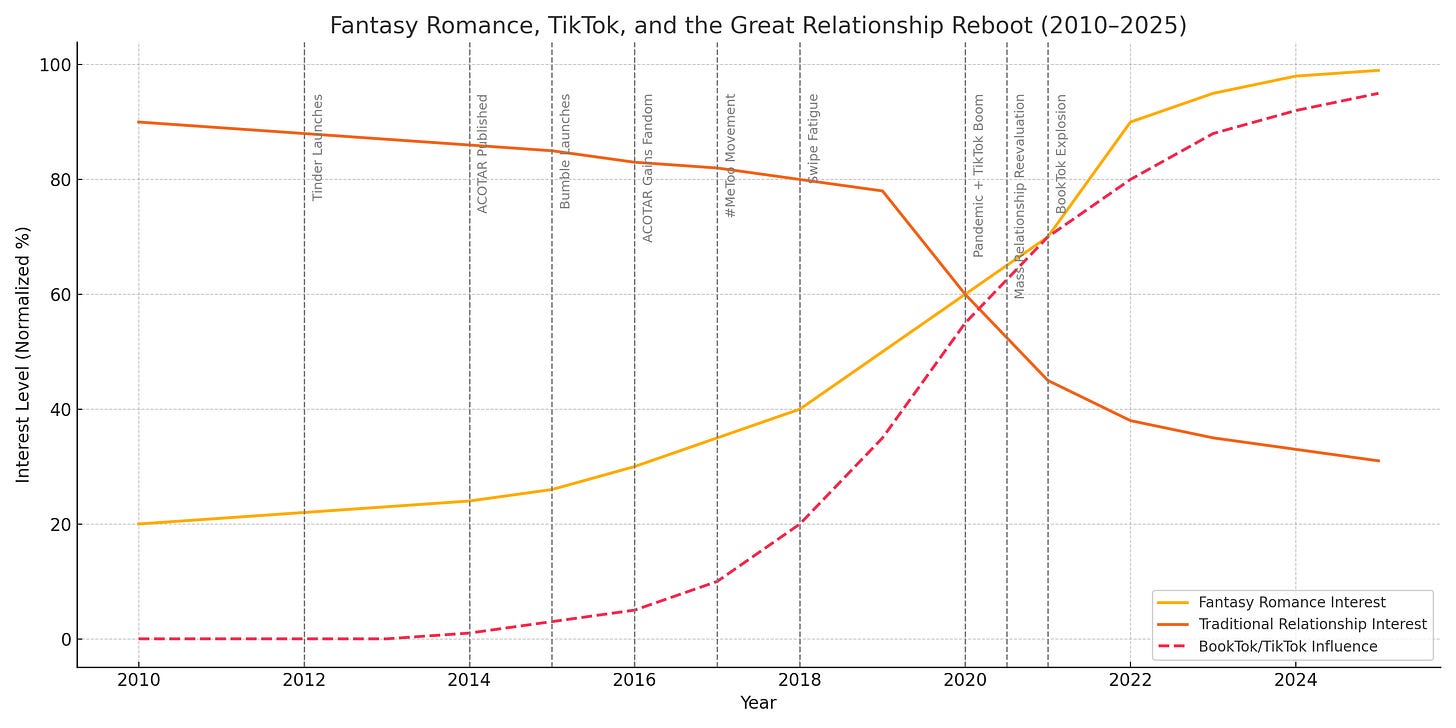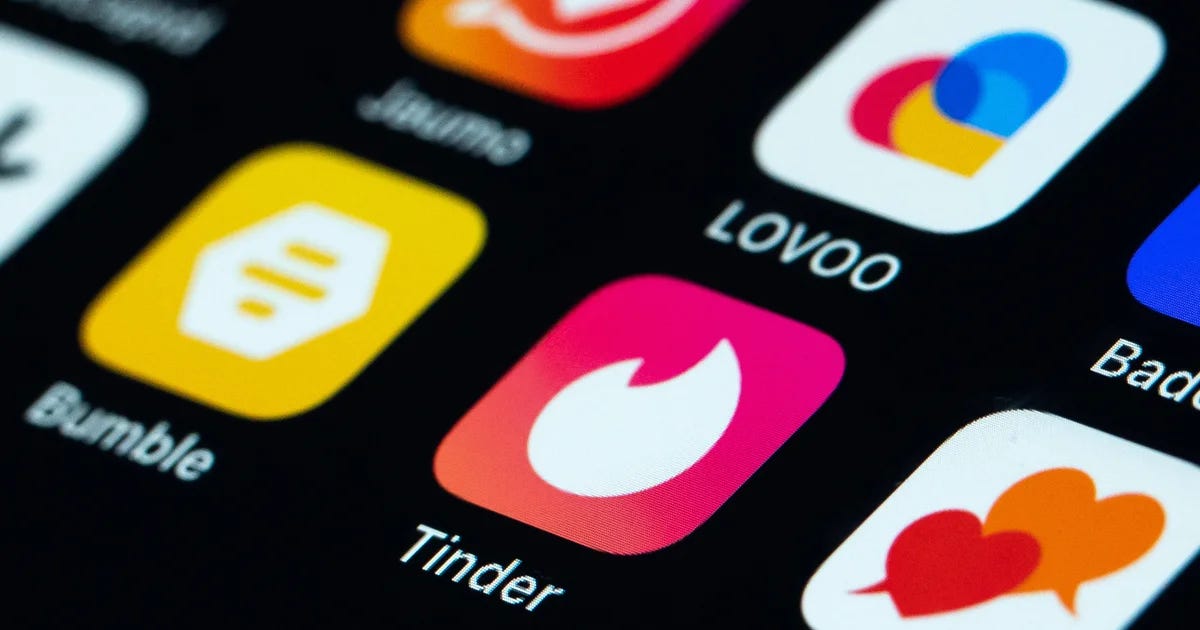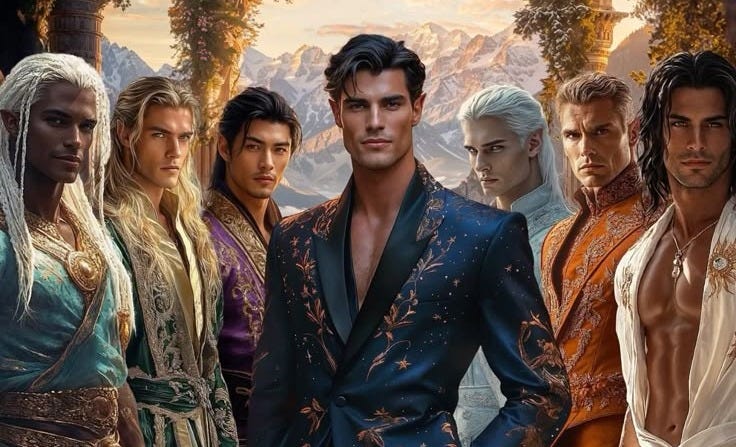The Cassian Index
Is fairy smut the leading indicator of collapse in the modern dating economy?
Guys, listen up—because men with wings are currently outperforming you in the dating market.
At this point, ACOTAR is practically required reading. Fourth Wing has dragon riders breaking BookTok. Fantasy Romance is on track to exceed 2024’s $610 million market. Meanwhile, dating app downloads are plummeting and women are increasingly choosing to stay single. This is not some niche trend. This is market disruption.
Because while there are real men who still think emotional unavailability is somehow a flex, fictional warlords are modeling secure attachment, deep respect, and the kind of partnership that feels like a power-up instead of a project.
But the real question isn’t “why are women choosing fantasy?”
it’s “why hasn’t reality bothered to compete?”
Author’s note: While this analysis focuses on cis het women and heteronormative relationship scripts—because that’s where the clearest signals are emerging—the broader trend of opting out of misaligned connection echoes across identities.
Market Signal: Consumer Flight to Fantasy
According to research firm Sensor Tower, worldwide monthly active user growth for dating apps slid 10% year over year in Q1 20241—an acceleration from prior quarters. Downloads also dropped, and even robust ad spend failed to revive engagement. Hinge showed growth, but it wasn’t enough to offset Tinder’s continued decline.
By the end of Q2 2025, the fallout was visible: Bumble announced it would lay off 30% of its workforce.2 A month earlier, Match Group—the Texas-based parent company of Tinder, Hinge, and OKCupid—cut 13% of its staff.
Dating app downloads are in freefall because everyone’s got swipe fatigue. We’re deleting profiles en masse—maybe because we’ve finally realized we’re the product being sold, not the customer being served.
Meanwhile, A Court of Thorns and Roses (as a series) is approaching its 106th week on the NYT bestseller list.3 Bloomberg estimated romantasy book sales to be $610 million in 2024, a significant rise from $454 million in 2023.4 Fantasy romance dominates BookTok—There are some 1.1 million posts with the #romantasy hashtag, and more than 1.8 million centered on ACOTAR alone with billions of total views. Women seem to be investing their discretionary time and energy in fictional relationships instead of real ones.
In economics, when consumers abandon an entire sector for substitute goods, it signals market failure.
So is the explosive growth of fairy smut an indicator of collapse for the relationship economy?
The Great Relationship Recession
Fantasy Romance (aka Fairy Smut, Dragon Porn, etc) might be the most comprehensive consumer insight report on female desire that’s ever existed. And if you think it’s just that we’re waiting on a man with a truly impressive…wingspan—think again.
It’s not about magic. What we’re into is mutual thriving, strategic protection, and reciprocal emotional safety systems. If you look closely, the relationship structures read less like fairytale and more like business plans designed to maximize compound returns.
So what happens when the most satisfying relationships in your life are fictional—and feel more emotionally credible than anything the apps can produce? What happens when the best character development arc in a man you've met is... on your Kindle?
The data:
Single women are statistically happier than married women across every metric5 including mental health, financial security, life satisfaction, even physical health outcomes. Meanwhile, married men show dramatic improvements across these same categories.
Data from the Pew Research Center shows 34% of single women are actively seeking romance, compared to 54% of single men.6
“Instead of settling for a relationship that ‘isn’t going to serve them,’ women would much rather wait,” according to dating and relationship expert Danielle Szetela. “They’re afraid of losing themselves in relationships that ask them to shrink, settle, or self-abandon,” she added, noting that women are now “choosing peace over chaos, purpose over pressure, and emotional safety over surface-level connection.”7
Historical context: Marriage was designed as an economic arrangement where women provided domestic labor, child-rearing, and sexual availability in exchange for financial security and social status. (The Gilded Age is required watching.) Now we earn our own money and social status, find more fulfillment in friendship than partnership, and can have kids on our own.
The value proposition has fundamentally shifted, but relationship terms haven't.
Business Model Innovation: Scarcity vs. Satisfaction
Dating apps monetize scarcity and insecurity. They profit when you stay single and keep swiping, buying premium features to compete for access to people who may or may not be genuinely available. Dating app culture has gamified relationships into a marketplace where women provide emotional labor, physical availability, and domestic services in exchange for... what exactly? Inconsistent attention and the privilege of being someone's "maybe"?
Fantasy romance, on the other hand, monetizes satisfaction and empowerment. Publishers profit when readers feel fulfilled and want more The payoff is the happily ever after, and the system isn’t built to string you along—it’s designed to build momentum. These are ecosystems that expand with intimacy, instead of shrink under its weight, and the business model aligns with customer happiness rather than customer desperation.
So if dating is now a platform optimized for friction, and the commonly held advice tells women to "lower their standards" and "be grateful" for the bare minimum, fantasy romance is the cheat code. Not because it skips the work, but because it shows relationship systems where basic respect is the entry point, not the ceiling.
Customer Lifetime Value:
Dating app user: Churns between platforms, pays from desperation, deletes profiles, negative word-of-mouth
Romance reader: Follows authors across series, joins fan communities, recommends to friends, buys merchandise
The contrast: Dating apps depend on customer misery. Romance publishing thrives on customer satisfaction.
And to be clear: we aren't rejecting relationships—we’re rejecting the terms.
Product Development: The Fantasy Male OS
The rise of celibacy and decline of app downloads has triggered a very loud shaming of women for having "unrealistic expectations." Calling us unrealistic? That just sounds like the death rattle of a failing industry that refuses to improve its product offerings.
But what if it’s not our “unrealistic expectations” but that the current market is dramatically underperforming?
What we're really asking is:
If I can support myself financially, why would I accept a partnership that requires me to provide unpaid domestic labor, emotional management, and exclusive sexual access while receiving inconsistent attention and minimal emotional support in return?
Enter the fae male.
BookTok might be the most powerful user-research lab ever built. Authors aren’t guessing—they’re responding to what women actually engage with, not what we’ve been told we’re allowed to want (because we've been socialized to minimize our needs).
Here's the spec sheet readers have designed:
Core Features
Consent-forward intimacy: Every interaction requires explicit enthusiasm
Resource abundance: No scarcity mindset around attention or support
Emotional intelligence: Feelings are valid data, not inconveniences
Power sharing: Strength enhancement rather than dominance
Investment mindset: Long-term building over short-term extraction
Premium Upgrades
Telepathic communication: eliminates emotional labor of explanation
Immortality: relationship security without death anxiety
Magical abilities: actual problem-solving power vs. expecting women to manage everything
Mate bonds: eliminates dating marketplace competition
This isn't wishful thinking—it's systems design. We've identified bugs in traditional relationship software and coded better alternatives.
Choose Your Fighter: The Fantasy Archetypes
Let’s talk product-market fit—because A Court of Thorns and Roses didn’t go viral by accident; it offered options. Specifically, three male archetypes that now serve as templates for reader desire—and relationship design.
👑 Rhysand: The Strategic Equal
He’s your executive partner. Political, polished, emotionally literate. Thinks in centuries. Master of power-sharing. Plans three steps ahead but always in service of the relationship.
Relationship style: Empowerment through systems design
Strengths: Respect, vision, resource mobilization
Competitive advantage: Autonomy, earned trust
Weakness: May feel too composed or performative if you crave mess
IRL translation: The CEO who's done multiple ayahuasca retreats and knows your love language, he redefines the relationship power dynamic by making partnership feel like possibility rather than compromise. He champions your growth, builds entire systems around your autonomy, and makes sure the rest of the world adjusts accordingly.
🛡️ Cassian: The Vulnerable General
He’s your emotionally-attuned protector. Loyalty-first devotion with range. Says what he means. Hot, but not confusing about it. His appeal isn’t brute strength—it’s the safety of someone who would kill for you, and wants to hear how your day went.
Relationship style: Safety through presence
Strengths: Vulnerability, advocacy, full-hearted commitment
Competitive advantage: Stability, clarity, emotional IQ
Weakness: Risks burnout without reciprocity
IRL translation: The emotionally fluent firefighter who got your cat out of a tree (I wish this wasn’t a euphamism) quotes Brené Brown, and asked for your number (but you’re still waiting on him to ask you to coffee.)
🔥 Azriel: The Shadow Romantic
He’s your soft-spoken executioner. Knife in his hand, poetry in his soul. Shows his intentions through actions more than words, but when he says, “I would kill for you,” he means it—and probably already has.
Relationship style: Devotion through discretion
Strengths: Loyalty, listening, emotional depth
Competitive advantage: Lethal competence, tactical intimacy, zero posturing
Weakness: May take emotional labor to open up
IRL translation: The bouncer at your favorite bar who somehow already knows your name and is right there to intervene when the inebriated Chad you met on Hinge isn’t reading your ‘this date is over’ signals.
🚩 Tamlin: A Cautionary Tale


The tragic traditionalist. He loves you—he just doesn’t respect you. Tamlin is the blueprint for every man who thinks being a provider is enough, even if he never adapts to your actual needs. Initially seductive, ultimately suffocating. This character resonates because so many women have lived the reality. He’s not a villain, just a man who never updated his software.
Relationship style: Safety through control
Strengths: Resource access, loyalty (to a point), surface-level security
Competitive advantage: Stability (in theory), traditional masculine appeal
Weakness: Resists growth, equates love with ownership, emotionally rigid
IRL translation: The insecure finance bro who picks up the check after talking about himself all night, texts but never asks a single question, and gets weirdly jealous of your success.
→ See also: Xaden from Fourth Wing, whose entire character arc is just one long red flag flying from the tail of a dragon.
☠️ The Problem with Xaden (and why Fourth Wing is a False Positive)
Xaden should align with the fae male archetype: dangerous, devoted, deep. But the execution is a character whose personality is 90% clenched jaw muscles and 10% manufactured mystery—like Rebecca Yarros confused brooding with chronic TMJ syndrome.
Why it fails:
Emotional intelligence is told, not shown
His protectiveness feels like surveillance
His devotion is inconsistent and driven by plot, not character development
And the banter? No.
Xaden isn’t fantasy spec—he’s a market knockoff. Fourth Wing is what happens when you try to reverse-engineer the Cassian Index without understanding the user behavior data behind it. (Do I need a separate post that breaks down why Fourth Wing doesn’t work in general?)
Strategic Translation: Fantasy to Reality
The genius isn't the magic—it's systematic design of relationships that function optimally for both parties. Decode the magic, get the system:
"Mate bond" = committed attachment without artificial scarcity
"Mind-reading" = emotional intelligence and proactive communication
"Magical protection" = consistent support and advocacy
"Immortality" = long-term thinking and relationship investment
"Power sharing" = mutual empowerment vs. zero-sum dynamics
None of these traits are unrealistic. They're just unmet needs reimagined through fiction.
Market Predictions: The Romance Correction
We're watching a real-time market correction in relationship expectations. The first generation of women with true economic independence is rejecting partnerships that don't enhance our lives, meanwhile, dating apps are hemorrhaging users and revenue as we abandon platforms that commodify human connection.
Expect:
Continued decline in marriage rates among educated women
Dating app industry consolidation as user bases shrink
Men who adapt gaining significant competitive advantage
Alternative connection methods replacing app-based dating
Relationship coaching focused on “fantasy” principles vs. "settling" frameworks
The women who seemed "too picky" aren't unrealistic—they’re early adopters of better UX.
The Real Magic: Systems, Not Spells
Fantasy romance doesn’t just deliver hot male leads—it provides the consistent systems of emotional regulation that modern dating lacks. That’s the real payoff. (And it’s why the same woman who ghosted you last week is probably halfway through her third re-read of Silver Flames.)
Because fantasy isn’t just a retreat—it’s a recalibration, and it isn't replacing men—it's replacing low-yield emotional investments that no longer justify the cost.
We didn't leave the relationship economy for the stories per se, but we definitely got sick of being sold the fiction that breadcrumbs are a meal. And we aren’t out here demanding perfection, just asking for clarity, communication, and emotional safety—right now that’s easier to find in books than bars.
It’s not delusion, it’s discernment.
Welcome to the Cassian Index.
These "unrealistic" standards are the new requirements based on cost-benefit analysis—because when the value of partnership is measured against financial independence, career fulfillment, friend groups, and full autonomy, the bar gets significantly higher.
Fantasy romance shows what clearing that bar actually looks like.
The market has spoken: time for reality to step up its game.













I love this! I haven’t read silver flames yet. ACOTAR for life though. Never would I have analyzed fantasy romance through the lens of UX and anthropology… you little genius, I feel smarter by association. More on fourth wing? Agreed Xaden is a butt, but I love the relationships between dragon and rider. Plus Vi’s group of friends is cute and supportive of each other.
Good one. I think I have some reading to do!! LOL!